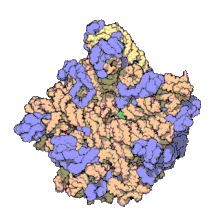RNA

Isaac Asimov
Ribonucleic acid (RNA) is a polymeric molecule. It is implicated in various biological roles in coding, decoding, regulation, and expression of genes. DNA and RNA are nucleic acids, and, along with proteins and carbohydrates, constitute the three major macromolecules essential for all known forms of life. Like DNA, RNA is assembled as a chain of nucleotides, but unlike DNA it is more often found in nature as a single-strand folded unto itself, rather than a paired double-strand. Cellular organisms use messenger RNA (mRNA) to convey genetic information (using the letters G, A, U, and C to denote the nitrogenous bases guanine, adenine, uracil and cytosine) that directs synthesis of specific proteins. Many viruses encode their genetic information using an RNA genome.
| This science article is a stub. You can help out with Wikiquote by expanding it! |
Quotes
[edit]- A healthy, mature human being of normal intelligence may have upwards of 20 million RNA molecules [thought to serve as a ‘filing system’ for memory] in each neuron. . . . An RNA molecule made up of merely 25 links could have any one of a million billion different combinations, . . . In fact, every RNA molecule contains many hundreds of units—not merely 25.
- Isaac Asimov, The New York Times Magazine, October 9, 1966. Cited in Awake! magazine, in the article: Designed to Last Forever, 10/8 1970.
- There is no question, then, that RNA presents a filing system perfectly capable of handling any load of learning and memory which the human being is likely to put upon it—and a billion times more than that quantity, too.
- Isaac Asimov, The New York Times Magazine, October 9, 1966.

